The Loeb Center for Career Exploration and Planning orients Amherst students to the future while drawing deeply on a traditional liberal arts model that emphasizes persistent questioning, critical thinking, clear communication, and openness to change. Over the course of Amherst’s history, career development practice has responded and evolved in relation both to the College’s own transformation and larger societal shifts.
Today, the Loeb Center emphasizes in-depth exploration through internships while helping students expand and enhance their social capital, backed by the center’s core strength: an industry-specialist advising model (Career Communities) that generates pathways into a broad range of professions. In addition to advocating for career counseling at key moments in the College’s history and engaging with students and recent graduates in multiple ways, our alumni have helped to shape career programming with their support. Early funds such as the W. MacLean Johnson ’38 Memorial Fund and the Latham Internships in Washington Fund paved the way for defining innovations like Career Communities, the Meiklejohn Fellows, and the Charles Hamilton Houston Internship Program.
Pre-1900
1818 | The Charity Fund
A fund of $50,000 was raised under a constitution stating that its purpose was “for the Classical Education of Indigent Young Men of Piety and Talents for the Christian Ministry.” This fund became the foundation of the Amherst College endowment.
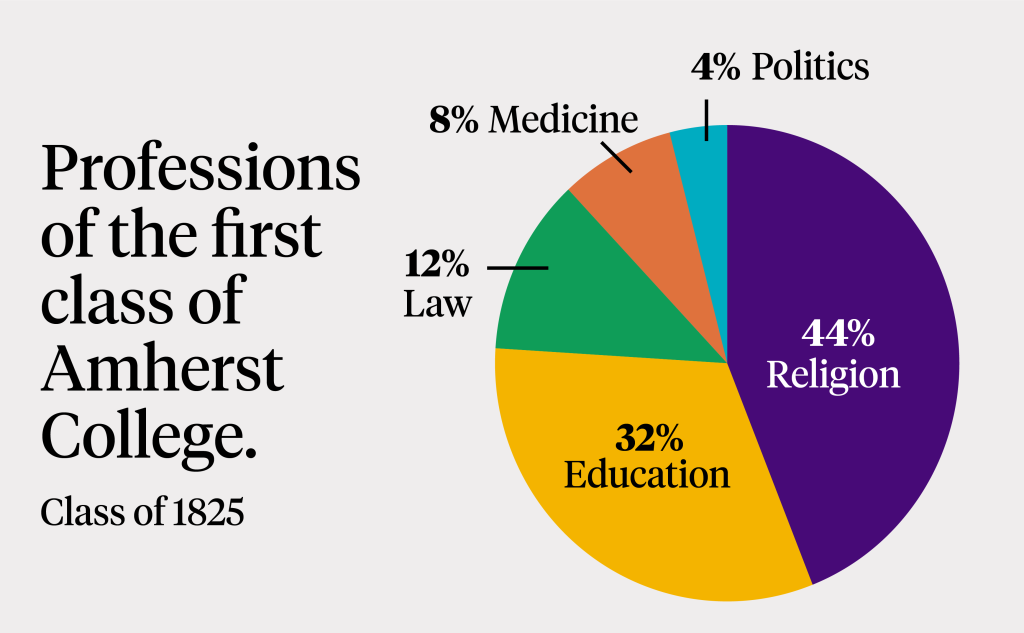
1821 | Amherst College Founded
From its start, Amherst enrolled students who might not commonly have had access to higher education. Many of the College’s early graduates found positions leading congregations and seminary schools around New England, and were guided by the faculty in their choices.
“Before there were career centers on college campuses, faculty assumed the responsibility of mentoring their students and preparing them for future employment.” (Farouk Dey, Christine Y. Cruzvergara, Evolution of Career Services in Higher Education)
Professions of the first class of Amherst College (class of 1825): 44% Religion, 32% Education, 12% Law, 8% Medicine, 4% Politics
1900-1950
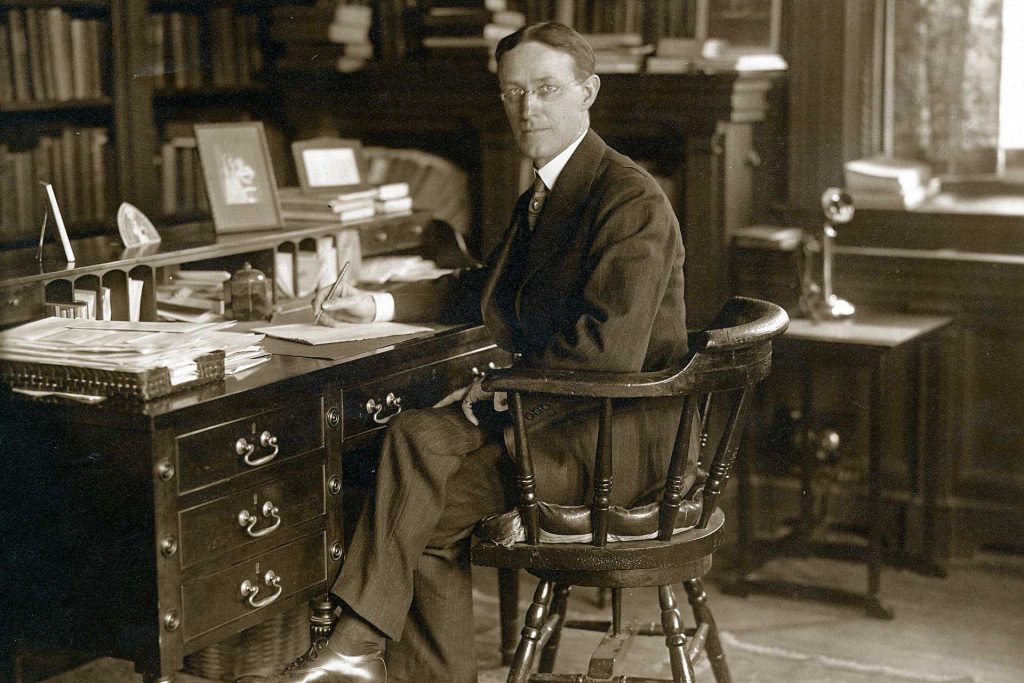
1912-1924 | President Meiklejohn
Alexander Meiklejohn, an educator, innovator, philosopher, and advocate for liberal social reform and First Amendment freedoms, served as president of Amherst College from 1912 to 1924. Appointed at 41 years of age, Meiklejohn was Amherst’s youngest president. Later in his life, he received the Presidential Medal of Freedom.
“According to Meiklejohn, the purpose of the liberal college was not to prepare students for gainful employment—that was something trade schools and research universities could do—but rather to foster a capacity for critical intelligence and social reform.” (Nelson, Education and Democracy, p. 63)
Learn more about Alexander Meiklejohn.
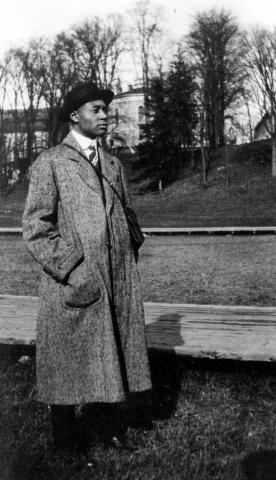
1915 | Charles Hamilton Houston Graduates
Houston (1895-1950) attended Amherst during the tenure of President Mieklejohn. He served as Dean of Howard University Law School and was the guiding genius behind the fight against school segregation in the United States, laying the groundwork for the landmark decision in Brown v. Board of Education. Houston also mentored Supreme Court Justice Thurgood Marshall.
1928 | Professional Societies
A decade after World War I, a trio of professional societies at Amherst was established to assist students pursuing medicine, law, and the clergy.
1940-1950 | Post-War
After World War II, the career plans of students broadened over time, in conjunction with Amherst’s own evolution and larger societal shifts.
“The landscape of higher education and career guidance changed once again post-World War II in the 1940s and 1950s. A booming economy and greater employer demand for candidates, juxtaposed with the need to place graduating war veterans who returned to college on the GI Bill, accelerated the transformation of vocational guidance into the placement paradigm and the expansion of placement centers in higher education… placement centers were responsible for matching graduates’ abilities and interests with job criteria.” (Farouk Dey, Christine Y. Cruzvergara, Evolution of Career Services in Higher Education)
1951-2000
1951 | Report of Guidance Placement Committee
On May 28, 1951, the Executive Committee of the Alumni Council recommended that the College establish an Office of Guidance, Counseling and Placement. This was born from a recognition that as the global economy had become increasingly complex, career counseling was necessary in assisting young graduates with the transition to postgraduate life. The Committee made several recommendations, including employing a full-time career counselor, inviting interviewers on campus, and inviting young alumni to speak about their positions.
1967 | Office of Career Guidance Established
Amherst College’s first Office of Career Guidance was established in 1967 and offered services such as a library of employment opportunities, interviews with graduate schools in the fields of law and business, and seminars with speakers in various employment fields. In 1968, the top fields for Amherst graduates to pursue were education, medicine, law, and business.
1968 | W. MacLean Johnson ’38 Memorial Fund
The W. MacLean Johnson ’38 Memorial Fund was established in 1968 by Frances Chapman in memory of her husband, W. MacLean Johnson ’38. This is the first fund on record that became a source of financial support for student internships; as of 2020, the fund supports eight students per year across a range of public service internships.
1970 | Career Counseling at Amherst
A career guide published during this time highlighted the ways in which the career office is an extension of a liberal arts education.
“Ideally, career development reinforces the goals of a liberal arts education, since it enables students to identify the skills and develop the attitudes which will broaden personal perspectives and make them aware of a variety of options in the larger society.” (Career Advising Pamphlets , Amherst College Archive)
1982-1985 | Expanded Offerings
In this three-year period, the Career Counseling Office significantly expanded and improved its offerings, establishing a corps of student Peer Career Advisors, creating more networking opportunities with alumni in Boston and New York, and employing new assessments like Myers-Briggs to assist students with reflection and exploration.
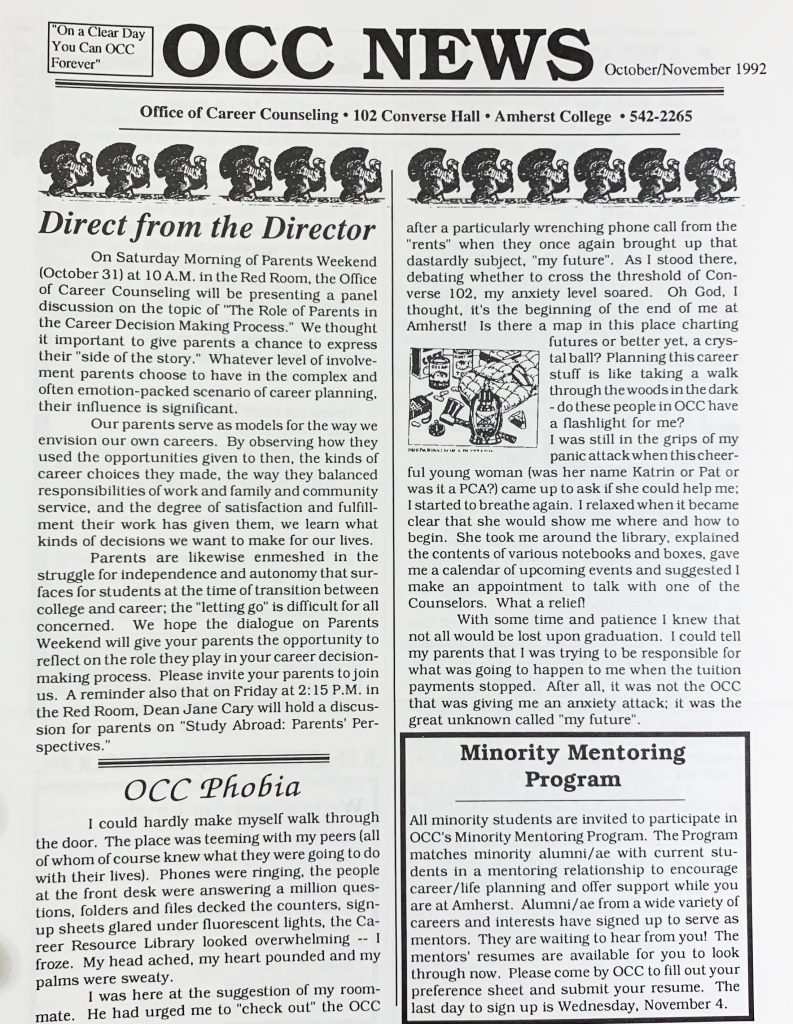
1990 | Minority Mentoring Program
“All minority students are invited to participate in OCC’s Minority Mentoring Program. The Program matches minority alumni/ae with current students in a mentoring relationship to encourage career/life planning and offer support while you are at Amherst. Alumni/ae from a wide variety of careers and interests have signed up to serve as mentors.” (OCC News October/November 1992, Amherst College Archive)
1992 | Charles Drew Health Professions Society
The Charles Drew Health Professions Society was established to act as a support network for students with underrepresented identities in medicine who were interested in pursuing medical careers. The motivation for establishing the Society was the high percentage of underrepresented students who entered Amherst College seeking to graduate as pre-meds, only to later give up this pursuit.
1998 | Rebranding as the Career Center
The newly rebranded Career Center outlined its approach to career guidance as an individualistic and educationally-based exploration:
“Whatever the form of academic experience—lecture course, seminar, conference, studio, laboratory, independent study at various levels—intellectual competence and awareness of problems and methods are the goal of the Amherst program, rather than the direct preparation for some profession.” (Student Handbook 1997-98 p. 6, Amherst College Archive)
2001-The Present
In the early 2000’s, a new relationship began to emerge between the Career Center and Advancement, through which alumni were invited to serve more explicitly as supporters, thought partners, and valuable sources of expertise and insight for students. This resulted in several new endowed funds sponsored by alumni and parents, which in 2003 provided more than $150,000 in stipend funding for traditionally under-funded internship opportunities in the non-profit sector.
2002 | Pre-Business Leadership Seminar
The Pre-Business Leadership Seminar was launched by a student group and supported by the Career Center. This event helped students understand the many facets of the business world and engaged a variety of alumni in business and finance. The format, with some changes over time, lasted until the launch of the Careers in Business and Finance career community in the Career Center (2015), at which point a professional adviser began bringing alumni in the field to campus as part of comprehensive career education programming.
2003 | Alumni Directory
The creation of the Alumni Directory provided the staff of the Career Center with easier access to alumni willing to volunteer their time and expertise.
“A new era of connection and communication between the needs and interests of Amherst undergraduates and alumni in the working world who are willing to share their goodwill, knowledge, and experience.” (Career Center Annual Report 2003-2004)
2011 | EDU Group and Education Professions
Daniel Alter ’13 and Daniela Fragoso ’13 established an education-focused student organization to harness the growing passion among students for teaching and education, increase appreciation and respect for teachers, and tackle some of the inadequacies of the nation’s educational system. This group was also instrumental in advocating for a new program at the College to provide career counseling to the increasing number of students interested in careers in education after graduation.
Later in the same year, Chuck Lewis ’64, H’03, P’93 instigated a meeting among Professor Hilary Moss, Chief Advancement Officer Megan Morey, Professor Karen Sanchez-Eppler, and Alter. The result of the meeting was a dramatic new direction for career services at Amherst, centered on industry specialization and the hiring of professionals with relevant work experience in their advising fields. Through this “career community” model, students receive expert advising from specialist career advisors, participate in skill-building workshops and other experiential activities, and gain a sophisticated understanding of current issues impacting their fields of interest. Program directors nurture networks that include students and alumni and help students effectively prepare for professional opportunities in their chosen fields.
2013 | Career Community Programs
This new portfolio of initiatives was launched with the creation of the Education Professions career community at the behest of and with seed funding from Lewis and his wife Penny Bender Sebring P’93. This milestone gift cemented the expert advising career community model as a keystone for future development and organization of career services at the College. Sometime thereafter, the long-standing pre-med advising program was reimagined as the Health Professions career community.
2014 | First Trek
The Loeb Center offers its first career exploration trek trip. A select group of students traveled to San Francisco to immerse themselves in the technology industry and examine the intersection of tech, entrepreneurship, and finance. The trek included visits to employers such as Google, Facebook, Sequoia Capital, and Andreessen Horowitz.
In subsequent years, the Loeb Center expanded the trek program to include a variety of professional ecosystems in different cities: government and nonprofit in Washington, D.C.; finance in New York; and entertainment in Los Angeles, to name a few. The College also organized alumni networking receptions in each city, timed with treks, allowing students to practice networking and build valuable connections. Treks are largely underwritten by generous alumni.
2015 | Careers in Business and Finance
A new career community, seed funded by a generous alumnus, was launched in the Loeb Center focusing on career paths in finance, consulting, and other business functions.
2016 | Loeb Center Renamed
In 2016, Amherst’s Career Center became the Loeb Center for Career Exploration and Planning. The name honors a generous gift from Michael R. Loeb ’77 P’22 and Marjorie Loeb P’22 that helped ensure that “the Loeb,” as it is now known on campus, would become an ever more vibrant hub for career exploration.
2016 | Programming Support for First-Generation and/or Low-Income Students
Amherst Trustee Arthur Koenig ’66 and his wife, Yvonne Koenig, provided generous funding for the Loeb Center to formulate new, targeted approaches to support the career development and post-graduate outcomes of first-generation and/or low-income students at the College.
2017 | First Advisory Council
The Loeb Center for Career Exploration and Planning Advisory Council consists of a dynamic group of alumni and friends of the College who are dedicated to expanding the Center’s reach and ability to connect students with experiential opportunities, in order to translate their Amherst education into future careers.
2018 | Careers in Arts & Communication
Through the generous support of an anonymous donor, a new career community focused on arts, journalism, marketing, and other communication-related careers was launched in the Loeb.
2018 | Launch of Meiklejohn Fellows Program
Drawing on the first two years of work with first-generation and/or low-income students, the Loeb Center reformulated its approach as a cohort program named for president Alexander Meiklejohn, honoring his legacy as an education reformer who laid the intellectual groundwork for Amherst to become the rigorous liberal arts college that it is today. The Meiklejohn Fellows Program provides wrap-around infrastructure for first-generation and/or low-income Amherst students through coordinated financial, academic, career planning, and social support.
The program launched with the Class of 2022, the most racially/ethnically and socioeconomically diverse class on record: 31 percent are Meiklejohn Fellows and 49 percent self-identify as U.S. students of color.
2019 | Launch of Charles Hamilton Houston Internship Program
In 2018, Chuck Lewis ’64 proposed and provided the lead funding for another new avenue for career development for students at Amherst: better resourcing its internship development team, focusing on employer-paid internships in a wide variety of for-profit and non-profit fields. His commitment, combined with major additional support from other donors, enabled the Loeb Center to envision a broader framework for connecting all students with meaningful summer opportunities.
Beginning in fall 2019, the Charles Hamilton Houston Internship Program supports an innovative and equitable structure for students to explore and plan for meaningful careers through off-campus summer experiences. The Loeb Center works with a large number of organizations to develop high-quality, paid summer internships and research opportunities for Amherst students. The program is named for Houston class of 1915 to honor his stature and legacy as a legal scholar and civil rights leader.
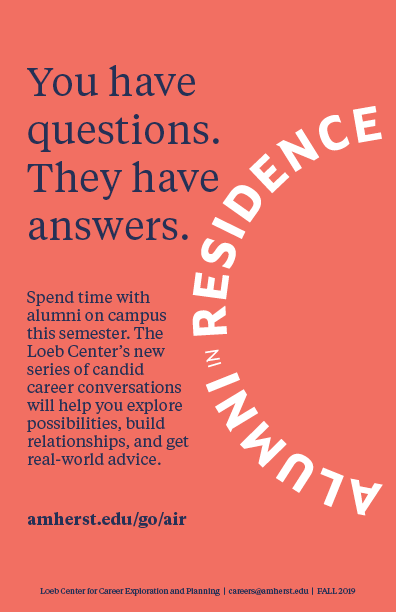
2019 | Alumni-in-Residence Program
Loeb Center leadership collaborated with the Loeb Center Advisory Council to design a new program to connect students and alumni in a high-touch series of conversations on campus. Alumni are enlisted as “co-educators” and host informal lunch roundtables, one-on-one office hours, skill-building workshops, and topical lectures.
2019 | Careers in Science & Technology
Majors in math, statistics, and computer science have seen explosive growth at Amherst in the last five years. Thanks to seed funding from donors Jason D. Spero ’94, Dr. Andrea McEvoy Spero, Rob Tarkoff ’91, P’22, and Jasmine Tarkoff P’22, this new program provides necessary career and graduate school advising for this population, fuels connections with alumni and employers in the field, and focuses Loeb Center collaboration with faculty on important issues of equity and representation in technology and the sciences.
2019 | Careers in Education Professions Endowment
Chuck Lewis ’64 and Penny Sebring permanently endowed the career community they long supported. It was the first to be endowed within the Loeb Center and was named the Lewis-Sebring Careers in Education Professions Program.
2020 | Careers in Business and Finance Endowment
Generous donors permanently endowed the business and finance career community, establishing the Traub Careers in Business and Finance Program.
